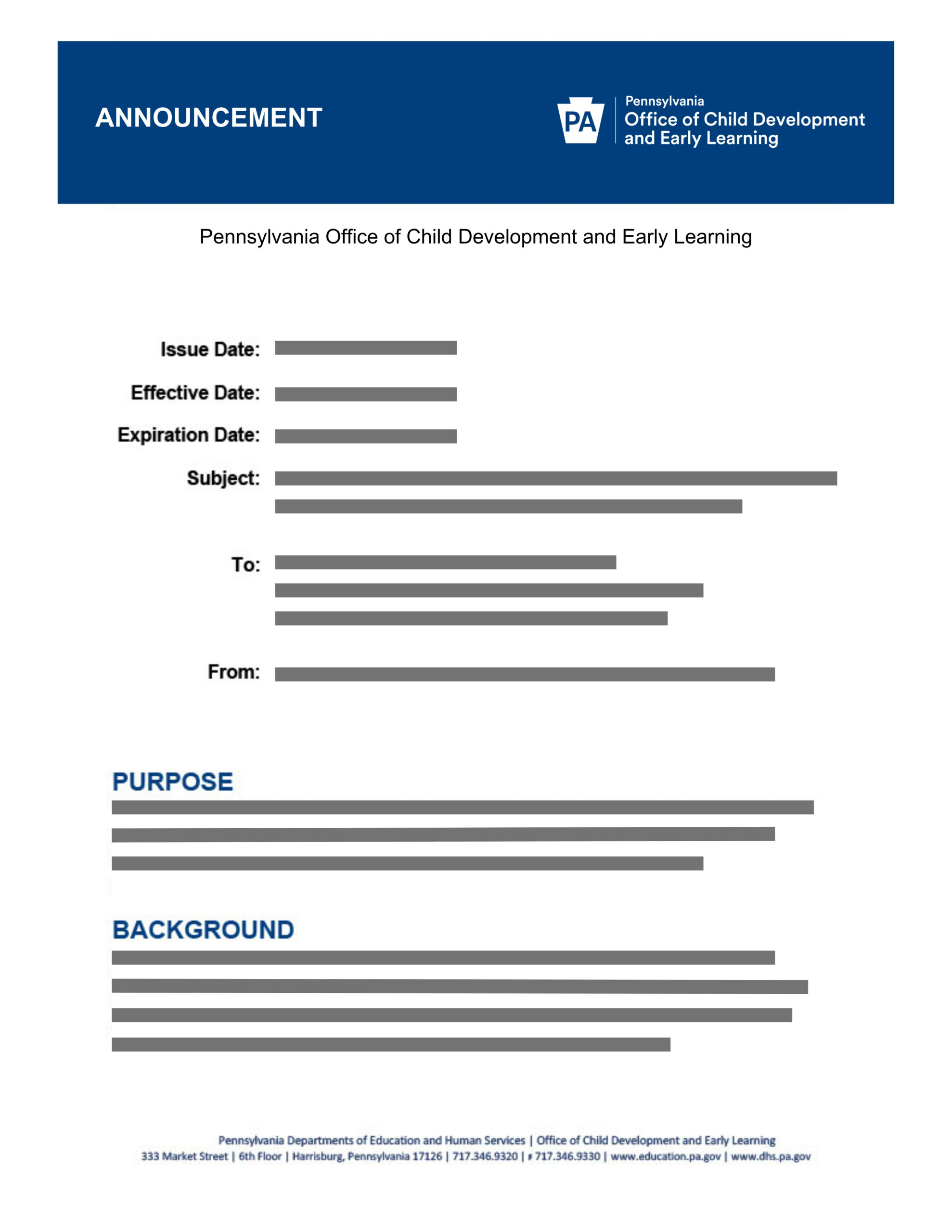 Created in 2007 by the Pennsylvania Office of Child Development and Early Learning (OCDEL), The Pennsylvania Key implements the work and supports the policies developed and managed by OCDEL. Learn More. >
Created in 2007 by the Pennsylvania Office of Child Development and Early Learning (OCDEL), The Pennsylvania Key implements the work and supports the policies developed and managed by OCDEL. Learn More. > Created in 2007 by the Pennsylvania Office of Child Development and Early Learning (OCDEL), The Pennsylvania Key implements the work and supports the policies developed and managed by OCDEL. Learn More. >
Created in 2007 by the Pennsylvania Office of Child Development and Early Learning (OCDEL), The Pennsylvania Key implements the work and supports the policies developed and managed by OCDEL. Learn More. >To:
From:
Shante’ A. Brown,
Deputy Secretary, Office of Child Development & Early Learning
Issue Date: December 05, 2024
Effective Date: December 05, 2024
End Date: June 30, 2025
To announce the 2024-25 Child Care Start Up and Expansion Grants, a one-time opportunity for eligible child care providers and other eligible early learning programs that intend to expand their current operation, establish a new program, or become a certified child care provider within specific regions of the commonwealth.
The CCDF final rule emphasizes funding for grants and contracts that enhance child care availability in geographically underserved areas, support infant and toddler care, and increase availability of services to children with disabilities. In 2022, The Office of Child Development and Early Learning (OCDEL) received a three-year Preschool Development Birth Through Five Renewal Grant (PDG-R) from the U.S. Department of Health and Human Services. As part of the PDG-R $16 million award, OCDEL has established Child Care Start Up and Expansion Grants in the 2024-25 state fiscal year. The intent of the grant program is to expand the availability of licensed child care in geographically underserved regions of the state to support families across the Commonwealth and meet the needs identified in the CCDF final rule by expanding services in these communities. Although insufficient child care availability is a statewide issue, a 2024 analysis completed by the Penn State Institute of State and Regional Affairs (ISRA) recommended that resources should be directed to Early Learning Resource Center (ELRC) regions 1, 2, 3, 6, 8, 9 and 10. This grant is paid directly to eligible entities through ELRCs, on behalf of OCDEL.
To be eligible for a grant, a provider must be located in one of the selected ELRC regions (1, 2, 3, 6, 8, 9, or 10) and meet the following requirements both as of Monday, December 2, 2024, and at the time the Grant payment is issued by the ELRC:
Providers who meet the above eligibility criteria as of Monday, December 2, 2024, but fail to meet the above criteria at the time of payment by the ELRC will be considered ineligible.
The intent of the grant is to expand the availability of child care opportunities in geographically underserved regions of the state. As a reminder, grant activities must take place in one of the seven ELRC regions identified in the ‘Background’ subsection (ELRCs 1, 2, 3, 6, 8, 9, and 10).
Some activities may require a provider contact OCDEL – Bureau of Certification Services to seek an increase in licensed capacity or an initial provisional Certificate of Compliance. Any certification requirements are outside the purview of the grant opportunity and the responsibility of the eligible provider.
Applies to the following eligible providers in ELRC regions 1, 2, 3, 6, 8, 9, and 10:
Examples of allowable activities under Type 1 – Conversion Grants include, but are not limited to, the following:
Type 1 Conversion Grant Maximum Amounts
| Current Provider Type | Converting to DHS Certified Group Child Care Home | Converting to DHS Certified Child Care Center |
|---|---|---|
| DHS Certified Family Child Care Home | $20,000 | $40,000 |
| DHS Certified Group Child Care Home | n/a | $40,000 |
| Early Head Start / Head Start | n/a | $30,000 |
| Private Academic Nursery School | n/a | $30,000 |
Applies to the following eligible providers in ELRC regions 1, 2, 3, 6, 8, 9, and 10:
Examples of allowable activities under Type 2 – Expansion Grants include, but are not limited to, the following:
Type 2 Conversion Grant Maximum Amounts
| Provider Type | Maximum Grant Amount |
|---|---|
| DHS Certified Family Child Care Home | $10,000 |
| DHS Certified Group Child Care Home | $25,000 |
| DHS Certified Child Care Center | $50,000 |
Applies to the following eligible providers in ELRC regions 1, 2, 3, 6, 8, 9, and 10:
Examples of allowable activities under Type 3 – Start Up Grant include, but are not limited to, the following:
| Provider Type | Maximum Grant Amount | Maximum Grant Amount | Maximum Grant Amount |
|---|---|---|---|
| DHS-certified child care providers opening a new certified program while maintaining operation at an existing location. | New Certified Family Child Care Home | New Certified Group Child Care Home | New Certified Child Care Center |
| DHS-certified child care providers opening a new certified program while maintaining operation at an existing location. | $15,000 | $40,000 | $75,000 |
NOTE: The charts above indicate the maximum amount an eligible provider can request by grant type. Eligible providers may apply for smaller grant amounts below the maximum limits if they choose.
Eligible providers can use grant funds for eligible expenses in six grant categories. Examples of eligible expenses in each category are provided below, but do not reflect an exhaustive list. The exception is the sixth category (Personnel Costs) in which there are only three allowable expenses. Grant funds can be applied to eligible expenses incurred from July 1, 2024, to May 30, 2025.
Providers should refer to the Child Care Start Up and Expansion Grant Additional Information and Frequently Asked Questions (FAQ) for further information on allowable expenses.
Grant funds cannot be used for any of the following expenses. Although the list is not exhaustive, it is provided for general guidance.
Eligible providers are encouraged to contact their ELRC with questions about the application process. ELRCs can provide support by answering questions or addressing concerns; however, to remain impartial, ELRCs cannot provide further guidance once a completed application is submitted for review.
To apply for this grant opportunity, eligible providers must complete the Child Care Start-Up and Expansion Grant Application. As part of the application process, providers are required to submit a Requested Budget using Appendix A: Budget.
Providers must submit applications to their ELRC and can refer to the 2024-25 Child Care Start Up Grants ELRC Submission Information for details. The selected ELRCs will accept applications from December 5, 2024, through January 31, 2025. ELRCs will score the applications as they are received but hold all applications for final funding decisions until after the application period ends on January 31, 2025. Applications received after January 31, 2025, will be considered ineligible. Funding for this grant opportunity is limited and not all grant applications may be funded.
Each eligible provider location can apply for one grant. Legal entities operating multiple locations can apply for one grant for each of their eligible locations. Head Start and Early Head Start grantees with multiple locations can apply for one Type 1 Conversion Grant for each eligible location.
Applications will be reviewed and scored by the respective ELRCs as they are received. Scoring is based on a 100-point rubric with an opportunity to receive five Bonus Points. However, the maximum total points a program can earn is 100. The Scoring sections and maximum point total for each are described below:
Additional information on each Scoring section and further instructions can be found in the Child Care Start Up and Expansion Grant Application.
Applications must receive a minimum score of 70 to be considered for funding by an ELRC. Depending on the number of applications received by an ELRC, demand may exceed available funding.
If an application is approved for grant funding, the provider will receive a Grant Agreement packet from their ELRC. This packet will detail the approved grant amount and the Grant Requirements and Conditions (Rider 2) the provider must follow throughout the grant period. Providers are responsible for reading, signing, and returning the Grant Agreement to their ELRC no later than February 28, 2025. They should only sign the Grant Agreement after agreeing to all information contained in the packet. Grant payments will be issued by the ELRC upon receipt of signed Grant Agreements.
Providers may discover that they wish to make changes to their approved Requested Budget once they begin spending grant funds. There are two changes which will require providers submit a Revised Budget to their ELRC for approval; they are:
Providers should wait to purchase any items not listed in their approved Requested Budget until they receive the approved Revised Budget from their ELRC.
Additionally, the ELRC may, in certain instances, ask a provider to submit a Revised Budget for other reasons not outlined above in order to offer additional support.
Providers will submit a Revised Budget using Appendix A: Budget and indicate the requested changes in the Revised Budget column. Providers must submit a Revised Budget no later than May 30, 2025. If the Revised Budget includes a request for additional grant funding and is approved, the ELRC will issue and send to the provider the following:
The provider must sign and return the Grant Agreement Amendment to their ELRC before the Revised Budget takes effect.
Providers are required to submit a Final Expenditure Report (FER) using Appendix A: Budget to their ELRC beginning May 1, 2025, but no later than June 13, 2025. The FER will detail how providers expended their grant funds as well as indicate any unspent funds they will be returning to the ELRC. Using Appendix A: Budget, providers will complete the Actual Spent/FER column and sign and return to their ELRC. ELRC’s will review the submitted Appendix A: Budget, specifically the Actual Spent/FER and if approved, sign and date.
If a grant application is denied by an ELRC, the provider will receive a Denial Letter from the ELRC. The letter will explain the reason an application was denied, and the process for submitting an appeal. Applications that were submitted and denied for not meeting the required qualification score will be kept in ELRC records and may be reconsidered if grant funding remains or additional funding becomes available.
The following timeline reflects important dates for eligible providers to consider regarding the grant opportunity.
